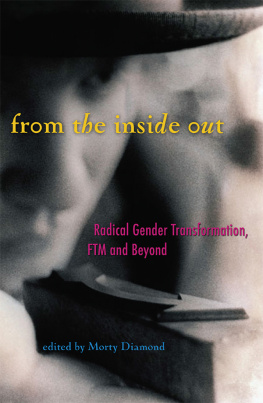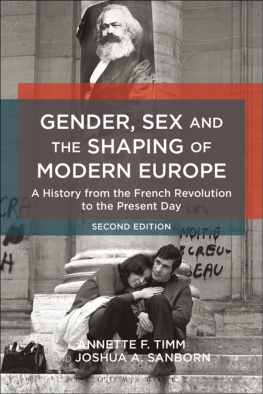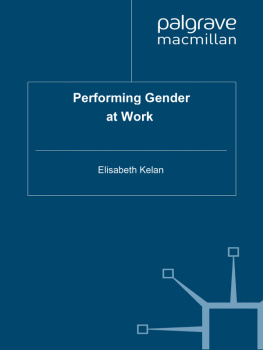GENDER AS A VERB
For Keith with love
Gender as a Verb
Gender segregation at work
ANNETTE FITZSIMONS
University of Hull, UK
First published 2002 by Ashgate Publishing
Reissued 2018 by Routledge
2 Park Square, Milton Park, Abingdon, Oxon OX14 4RN
711 Third Avenue, New York, NY 10017, USA
Routledge is an imprint of the Taylor & Francis Group, an informa business
Copyright Annette Fitzsimons 2002
All rights reserved. No part of this book may be reprinted or reproduced or utilised in any form or by any electronic, mechanical, or other means, now known or hereafter invented, including photocopying and recording, or in any information storage or retrieval system, without permission in writing from the publishers.
Notice:
Product or corporate names may be trademarks or registered trademarks, and are used only for identification and explanation without intent to infringe.
Publishers Note
The publisher has gone to great lengths to ensure the quality of this reprint but points out that some imperfections in the original copies may be apparent.
Disclaimer
The publisher has made every effort to trace copyright holders and welcomes correspondence from those they have been unable to contact.
A Library of Congress record exists under LC control number: 2002100327
ISBN 13: 978-1-138-72985-8 (hbk)
ISBN 13: 978-1-315-18840-9 (ebk)
Contents
Part of .
I am indebted to the following for their support, friendship, food and stimulating debate: Keith Russell, Miriam Fitzsimons, Lucy Vulliamy, Glynis Clemno, Jean Kellie, Les Garry, Caroline Wright, Daniel Vulliamy, Humphrey Forrest, Brian Milsom, Sam Fitzsimons, Maggie Blagdon, David Coates and John Grayson (who helped me to develop a love of teaching). A special thank you to Kathleen Lennon for her time, intellectual rigour and friendship. Of course, any errors, omissions or misunderstandings are all mine.
Beginning
In 1984 I completed a MA in Political Sociology at the University of Leeds. There were twelve other students on the course all men and the lecturing staff were men. The majority of the students, including myself, were all involved in left wing organisations and the differences between us led to some very lively and stimulating discussions. The fact that I was the only feminist in the group meant that I had to develop a very distinct and articulate defence of my theoretical position, which at this time I defined as Marxist-feminist and I found this extremely difficult to do. I began to realise that I had adopted the position without properly understanding the complexities of either term. This led me to scrutinise feminist theory and the writings of Marxist-feminists. From this study I began to develop a critique, in the first instance of the theory of patriarchy and then the concept of patriarchy, especially in relation to the conceptualisation of gender that flows from the concept. I also began to develop an understanding of the limitations of Marxist analysis of gender, race and class. The work began with the idea that it was possible to construct a materialist explanation of womens oppression that would overcome the theoretical problems I had found in my survey of Marxist-feminism. Much of this literature was centred on issues relating to womens labour, both paid and unpaid, and by the early 1980s the debates had become sterile and unproductive. I wanted to explore the possibility of constructing a new approach to these issues that would help to revitalise the Marxist-feminist perspective. Thus the main aim was to contribute to feminist theorising in the area of womens paid employment by developing a theoretical framework for analysing gender at work. I wanted to overcome both the limits of feminist theorising of the 1980s that relied heavily on a theory of patriarchy, and the inadequacies of Marxist-feminist theorising of the same period. The work that I want this theoretical framework to do is to clarify the relationship between the gender division of labour and the capitalist labour process in order to explain the reproduction of a gender ideology which legitimised womens subordination and oppression both in work and in the home, and which took account of male power and dominance. All of this now seems ridiculously ambitious.
I began by constructing a critique of both patriarchy and Marxist-feminism. Originally, I intended that the work would be purely theoretical, for a number of reasons. It was a constant struggle as an undergraduate to understand theory. Theory was both an intellectual challenge and a way of proving to myself that I could be considered an intellectual and therefore an academic. I also believed that theory was the only way to understand and therefore change the world. The eleventh theses from Feuerbach had long been a slogan I was fond of repeating in my attempts to explain to others my insistence on theory, and, of course, it had to be grand theory: a theory which would explain the world. I wanted to construct a totalising explanation of womens oppression, a meta-narrative. It was not that I necessarily thought that I would ever achieve this ambition, rather I believed that this way of approaching an understanding of womens oppression was the correct one the one true path to obtain the necessary knowledge needed to overcome oppression. The essence of feminism seemed to be just that a movement that struggled to understand and explain, in order to overcome the subordination of women worldwide. It never struck me that I was being overly ambitious.
The sociological perspective that constituted my theoretical framework was Marxism. Marxism represented both a method and an analysis. The method was dialectical historical materialism and provided me with a way of looking at and understanding the world, not only as it is organised now but also historically: how it had developed and changed. The Marxist analysis of capitalism helped me to understand how the system operates and provided a theory of how it can be overcome. However I was aware of the limitations of this analysis, especially in relation to differences between people. The abstractness of the Marxist analysis of capitalist social relations meant that it tended to objectify human beings in relation to labour as a commodity which neglected their subject position and how these positions are shaped by gender and race. Marxism ignored the role of gender in similar ways to mainstream sociology. Therefore Marxist-feminists had to establish women as a gendered category for Marxism as well as for conventional sociology.
It was suggested that I should conduct empirical research in order to test out some of the theoretical problems. Reluctantly, I dragged myself away from the masters, and put together a project that involved interviewing women and men who were involved in computers. I chose the field of computers for a number of reasons. Before my entry into higher education, I had worked as a computer operator. I had always wanted to become a programmer but at the age of twenty-three had been considered too old to learn the new world of computers. I worked for nearly 10 years in a number of organisations as a computer operator and so it was an environment in which I felt very comfortable and secure. If there was one thing I had some confidence in, it was the world of work, especially in the computing industry. I also wanted to ask questions of men as well as women at work. Most of the literature from Marxist-feminists had produced accounts of womens work in order to explain the segregation of work in terms of gender and there is a tendency in these accounts to explain the specificity of womens work as a consequence of male dominance. I wanted to put this type of explanation to one side by exploring an area of work that was to some extent gender-neutral.








